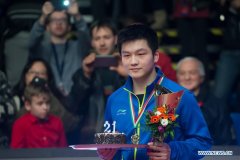Teen sensation challenges China's table tennis dominance
By Sportswriter Cao Jianjie
WUXI, China, April 17 (Xinhua) -- Chipping away at China's longtime dominance in table tennis is a petite 17-year-old Japanese girl who waves her racket as if brandishing a machete.
Playing a lightning-fast attacking game, Miu Hirano sent three top Chinese players packing en route to Japan's first Asian title in 21 years and sounded a stern warning to China that its trip to the 2020 Tokyo Olympics will not necessarily be an easy one.
The girl, who stands at 1.56 meters, produced the biggest shock to the spectators (even if it was not much of one for Chinese coaches) during the recently concluded Asian Table Tennis Championships, beating world No. 1 and three-time Olympic champion Ding Ning after surviving five match points.
China's coach cited "post-Olympics lows" as the reason for Ding's defeat, just as in the case of dual men's Olympic champion Ma Long, who lost to South Korean Jeong Sang Eun in the round of 32.
It was Hirano's straight-set wins over world No. 2 Zhu Yuling and No. 5 Chen Meng that woke up Chinese coaches, who suspect something might be wrong with the Chinese team, at least with the young players.
"No one can beat three top Chinese players by mere luck," said Li Sun, coach of Zhu Yuling.
The coach, who had guided Wang Nan, Zhang Yining and Li Xiaoxi to top the podium in four Olympic Games, said Hirano will remain the top threat to Chinese women for the near future, adding the Japanese girl has been "underestimated" despite her status as a World Cup champion.
Hirano was crowned as the youngest-ever World Cup winner last year with notable Chinese absences, and became the youngest national champion late in the year.
With Japan previously known as a cradle of flash-in-a-pan stars like Ai Fukuhara and Kasumi Ishikawa, better known for their good looks, Hirano wasn't taken seriously until the Asian championships.
"We knew young Japanese players were good, but we didn't expect them to be that good," said Li.
Li was so upset with Zhu's lopsided loss to Hirano that he burst out "I could not save her if she keeps playing like this."
With 2012 Olympic champion Li Xiaoxia in retirement and Ding Ning and Liu Shiwen heading into the twilight of their careers, Zhu Yuling and Chen Meng are expected to shoulder the bulk of the responsibility in the 2020 Olympics. But their tests at the Asian championships were way below expectations.
"After Ding Ning was eliminated, no one was able to stand up against Japanese challenges. Young players lacked confidence and were unable to fight back when they were forced to the edge of a cliff," said Dr. Liu Wei, a world champion-turned professor at the prestigious Peking University.
Liu, who commentated on the Chinese national television's live broadcast of the Asian championships, said Japanese women were better prepared and more motivated than their Chinese counterparts.
"The Japanese are keen to make a breakthrough in Olympic table tennis in 2020 and therefore they value every encounter with China as a learning experience," she said.
"It was a smart move for Japan to send teenage players to take on top Chinese players, Win or loss, it is a valuable experience for them," she added.
Liu noted a spike in TV ratings when Chinese played against Japanese in table tennis finals.
"People are bored at Chinese winning all the time," she said. "The world of table tennis loves to see China lose in big matches."
"That's news. Isn't it?"
At least one Chinese, however, was not totally astounded by the win: Hirano's coach, Wang Rui.
Wang, a former player at the provincial level for Hebei, moved to Japan 15 years ago, becoming the head coach of Japan's junior elites' school.
Having coached top-ranked Japanese player Kasumi Ishikawa for six years, he began to work with Hirano and other promising youngsters in October 2015.
Hirano admitted she had become a better player since joining the Chinese Super League in 2016.
"I think it's fair to say that a Japanese paddler's success must have something to do with the Chinese," Wang concluded.
In the men's singles action in Wuxi, Japan's Koki Niwa contributed to China's angst by ousting China's No. 3 seed Xu Xin in the quarterfinals before he lost to Jeong Sang Eun.
Fan Zhendong saved some face for China by beating Jeong in the final.















